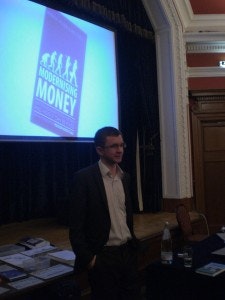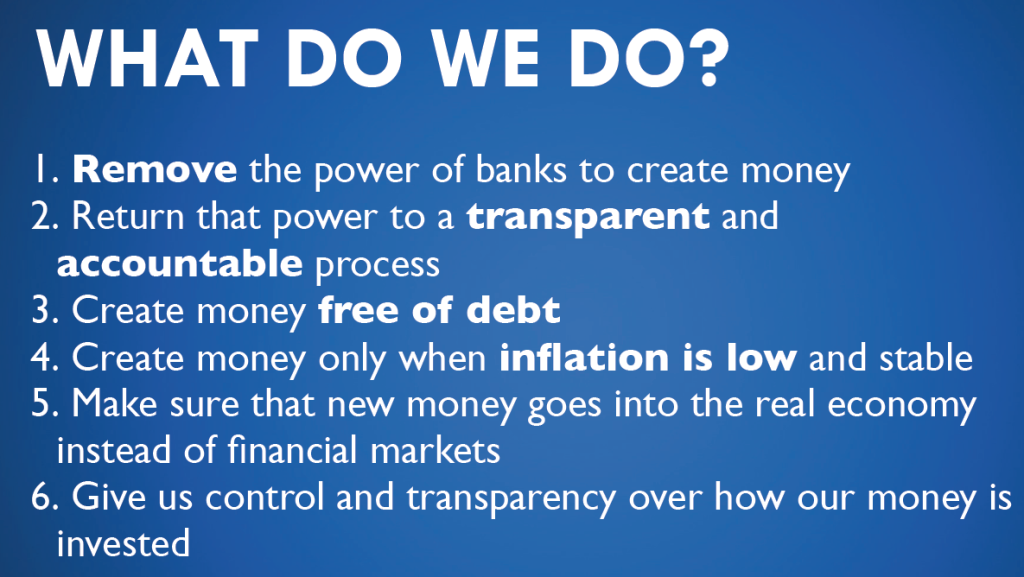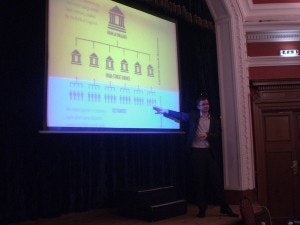Report of Positive Money Meetup in Edinburgh 20th Feb 2013

Report by the James Gibb Stuart Trust

Edinburgh, Wednesday 20 February 2013: This was a well-attended Meetup, with 47 people coming along to the Royal Scots Club. It began at 8pm, with a spokesman for the organiser of the event – the James Gibb Stuart Trust, an educational charity whose mission is “to reduce debt by educating about banking” – explaining that Ben was in Edinburgh for a meeting in the Scottish Parliament the next day.
This was the 3rd Meetup organised in association with Positive Money in Edinburgh. The first one was 18 months ago, on 31 August 2011 and the next was on 2 November 2011. In addition, in April 2012, the Trust helped Positive Money organise a Training Day for around 15 people in Edinburgh, one of whom is now working in its London office.
Ben spoke for 45 minutes and detailed the advances which had been made in the last 18 months since the first Meetup.
He said that the first book which had to be written was Where Does Money Come From? This was because, when they started to speak about “banks creating money”, they realised that there was simply no suitable book out there which detailed the facts of money creation. They paired up with the New Economics Foundation to produce the book.
Since then, more commentators, bankers and Members of Parliament were catching on to these facts; e.g. the recent Lord Adair Turner’s speech. That speech pointed out that after a crisis caused by too much debt, you cannot respond by prescribing even more debt as the solution!
That may have seemed obvious to us, but it needs people like Lord Turner to speak about it before the financial press take note.
Ben said that the current response of Quantitative Easing was not going to work. Putting money into the financial system, in the hope that it trickles down to the rest of us was not going to happen in the long term. What was more likely was that another round of QE might instead put money directly into public spending. This might have a more positive impact.
Once that happened, then people would begin to wonder why we could not have done that in the first place. They would also begin to wonder why, if the state can create money in this way, we are being taxed in the first place! This was likely to open up another window for the Positive Money message to exploit.
In that regard, he quoted from the recent article by Martin Wolf, the Chief Economics Commentator of the Financial Times in its 13-2-13 edition, questioning why is it presumably OK for money to be created for financial interests and house speculation, but not for industry?
Running through the consequences of the present privately-created money system, Ben pointed out that if one took out an average mortgage in 1952, it would have taken you 5 years and 3 months of your salary to pay back. Today it is 11 years and 8 months of your salary.
The Solution in 6 Steps

The solution was well mapped out, and he rehearsed the 6 points which he explained at the Positive Money Conference this January.
1. We remove the power of banks to create money.
2. We return that power to a transparent and accountable body.
3. We create money free of debt. This, said Ben, is one of the most fundamental points of the book. Under the present system, more money means more debt, and less debt means less money. What we need is less debt and more money – which is impossible under the current system. However, this reform separates the creation of money from the creation of debt. It changes the system and allows debt to be reduced at the same time as new money comes into society, if necessary.
4. We create money only when inflation is low and stable. Under the present system, the banks’ privately created money always leads to too much money and a bubble.
5. We can put this money into the real economy via spending on public services, lowering taxes, paying down the national debt, or giving to people in other ways.
6. The reform also requires banks to declare where they invest their customer’s money, giving transparency and customer control over the customer’s investment priorities.
As far as point 5 is concerned, he said that any one of these will work better than what is happening at the moment. He questioned the immediate need to pay off the national debt. He said that the principle of getting out of debt is to pay off the most expensive debt first and that is national personal debt.
After considering where the opposition was going to come from (including a financial services lobbying industry worth £93 million a year), the floor was then opened to questions.
Questions from the Floor

One of the questions related around how the banks managed to “run out of money” given that they can create it. This is a popular question and Ben explained how banks create money as liabilities, but they also need to have enough money in their central bank reserve account at the end of the day.
It is this latter form of money – which the individual bank is unable to create directly into that account – which it can “run out off”. Positive Money has written about this in the article, “If banks can create money how come Northern Rock went bust?”.
There was a question on how we could ensure that the proposed Money Creation Committee would be suitably independent from government. This has been thought through with some rigour and is covered in Parts 3, 4 and 5 of the Bank of England (Creation of Currency) Bill.
The Positive Money analysis considers that under its reform, house prices may stabilise, and not rise significantly – which would give time for wages to, perhaps, catch up. One person mentioned that current house prices are so ridiculously far ahead of average wages that wages may never catch up, and that house price deflation may have to be an inevitable consequence.
Another person wondered about whether the reform was possible given the inter-connectedness of the global financial system. Ben responded by pointing out that this reform is a reform specific to the national currency, and that it is entirely possible to be done in any country which still has a national currency. The UK would, in fact, he said, become a safe haven for money, and the pound sterling would hold its value better than other currencies. The new book from Positive Money, Modernising Money, deals with this question in section 10.3.
The environmental implications were also considered, and Modernising Money speaks about them in section 9.8.
The meeting ended at 9.30pm and a selection of money reform material was sold, including 10 copies of Modernising Money. At the end, around 15 people repaired to the bar upstairs for further discussion until late.
If you’d like to organise your own Meetup, then please read here. Also see the concluding comments of this article for some ideas on how to organise your own Meetup.